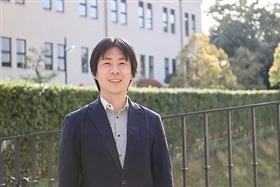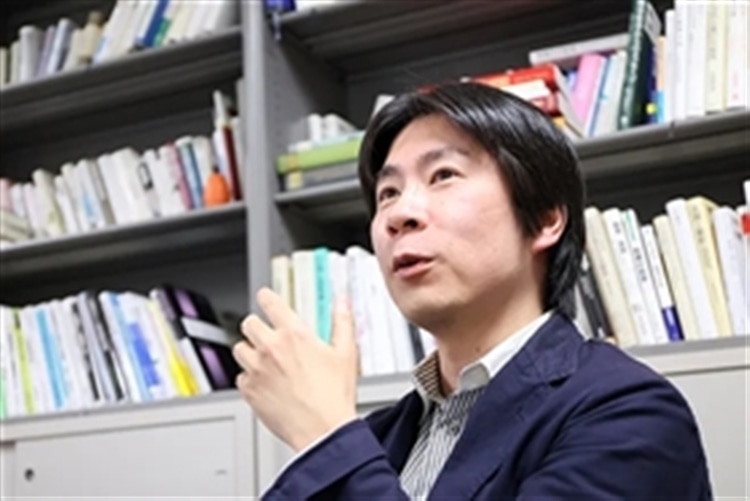- TOP
- Research
- Research Features List
- In the Lab
- Where Does Unconditional Love Come From? Being a Good Partner Through Social Psychology

For many people, their relationships with their partners - close friends and lovers - are an essential part of living a rich and fulfilling life. Partners are irreplaceable companions who can help you when you are in trouble and share in your joy. However, these relationships can also develop cracks from just a minor disagreement. Professor Hiroshi Shimizu, who specializes in social psychology, has been conducting research on such intimate interpersonal relationships. Why can humans form close relationships with others and love them unconditionally? We also asked Prof. Shimizu about the secret to maintaining good relationships with your partners.

Hiroshi Shimizu
Professor, Kwansei Gakuin University School of Sociology
Specializes in social psychology and group dynamics. Graduated from the Kwansei Gakuin University School of Sociology. Completed his postgraduate studies at the Osaka University Graduate School of Human Sciences. Ph.D. (Human Sciences) After serving as a JSPS Research Fellow, a Visiting Researcher at the University of Melbourne, and an Assistant Professor at the Hiroshima University Graduate School of Integrated Arts and Sciences, he took up an Associate Professor position at Kwansei Gakuin University in 2015. Has served in his current capacity since 2018. His research focuses on intimate human relationships, such as those between lovers and close friends, as well as the conditions for establishing those bonds, and how these relationships are connected to societal norms.
Summary
・People will act unselfishly when they feel that they cannot afford to be without the other person.
・Use “metacommunication” to resolve difficulties with people close to you.
・The trick to having a good interpersonal relationship with someone is not expecting too much from them.
Unconditional love is a unique survival strategy for humans
In the first place, what’s the difference between a partner and someone who’s just an acquaintance? It seems like there are various answers to that question, but according to Prof. Shimizu, a major difference is whether or not you can help them when they are in trouble without asking for anything in return. “One of the major themes that social psychology tackles is the question: why do people cooperate with others? Unlike humans, animals mainly help their parents or their siblings when helping others. From the point of view of nature, humans behaving unselfishly toward complete strangers is an extremely rare phenomenon. However, that doesn’t necessarily mean that humans will act unselfishly toward everyone with no conditions attached. In the first place, doing that in nature would get you exterminated. That’s why people have set conditions for choosing their partners, and it’s precisely those conditions that allow us to call certain relationships intimate. In other words, our partners are the people we feel we need to help,” Prof. Shimizu says. Why, then, have humans come to need partners?
“There are two convincing theories. The first is that people form these connections so that when they become sick or hurt, they will be able to mutually help each other. The second is that people do so to create allies for when there are fights between groups. Both theories allow people to adopt a strategy for dealing with crises that they cannot handle on their own. Since people extend helping hands to others without taking a mercenary point of view in those situations, we see those acts as unconditional love.” That sounds like a persuasive explanation for unconditional love, but it might be a downer for some people. However, the important thing here, according to Prof. Shimizu, is that “Having a relationship where we help another person without expecting something in return, and they do so in kind, means that we mutually recognize that the other person is unique and indispensable to us. For example, if there was some sort of genius who was irreplaceable to everyone, they might be able to gain the cooperation of the people around them without any preconditions. However, the vast majority of people cannot become such geniuses, so I assume that is why we strategize to form partnerships where the other person needs us and vice-versa.”

only apes, in rare cases, have been seen doing so
Ways to have close relationships have diversified with the times
Even if you say casually that you are close with someone, Prof. Shimizu says that the way your connection is formed will change depending on your relationship with them. If you have a relationship with someone as a friend, you will share each other’s joy and share each other’s troubles. If you have a relationship with someone as a lover, then fulfilling sexual desire is added to your connection, and if you marry them, your objective becomes the creation of a family. The transformation from friends to close friends, or from close friends to lovers, is not one where clear lines can be drawn. It is a one where the connection gradually changes from a give-and-take relationship to one where the other party is a unique person in your life.
Furthermore, Prof. Shimizu says, the way to have a close relationship will change according to social factors. “If we look at depictions of love in media such as novels and dramas, until recently, we often saw many so-called ‘romantic love’ stories, where the characters find their ideal partners and the story concludes with them getting married. Recently, however, there has been an increase in stories that do not follow that sort of pattern. We could say that with the passage of time, romantic relationships are becoming more diverse.” Going even further, sociologists and psychologists seem to think that the goal of love is shifting from starting a family to pursuing a relationship where people can be true to themselves. It may be only natural that when it comes to love and marriage, the values of younger generations do not align with those of their parents.
Being aware of differences is key to maintaining a good relationship with your partner
Everyone has experienced being at odds with a friend or lover over a minor difference of opinion. What should we do to maintain better relationships with our partners? Prof. Shimizu explains that there are two tricks to doing so: prevention and treatment. “First, let’s try to prevent these differences from cropping up. In psychology, there’s a phrase called the ‘illusion of transparency.’ It means that the closer we get to someone, the more we end up thinking that we understand them. This might seem natural, but we actually engage our partners in dialogue to learn what they are thinking less frequently as we grow closer to them, so differences of opinion may form without us realizing it. In addition, we tend to share less time with them because we are busy at work in our thirties and forties, and for married couples, they may find that the burdens of housework and childrearing cause them to have different levels of interest in each other. In this way, intending to understand the other person, but not understanding them at all, is what causes relationship issues. The way to prevent this is to know your partner very well. It’s important to know what bothers them and what makes them happy, and to communicate with them respectfully on a daily basis.” When it comes to resolving an argument, if the cause of the fight is known, it may be possible to come to a resolution by first discussing the issue with both parties’ interests in mind.
However, Prof. Shimizu says that it’s difficult to resolve fights where the cause of the fight is unknown. “When you don’t know why your partner is angry, and you wind up in a messy situation for some reason, both of you have different ideas about the conversation you are having. For example, your partner simply wants you to apologize, but you are thinking about how to make it up to them so they will forgive you. They get mad because they don’t know why you won’t apologize, and you’re confused because you don’t know why they won’t forgive you no matter what you do. These situations just get worse because you don’t talk explicitly about how you feel. In order to notice these sorts of differences, metacommunication – in other words, communication for the sake of communication – is necessary. Assume that you are trying to make peace with each other, and ask yourselves the question: ‘What are we talking about right now?’ Anger and pride may get in the way, but try to endure it. If you realize that the source of your argument is not a conflict of interest, but a difference how you communicate with each other, you should be able to get rid of that routine.”

I can’t really speak with an aura of authority…”
Wanting to eliminate the fragmentation of communication through social psychology
Social psychology deciphers human psychology from a bird’s-eye perspective, based on the relationships that people form with others. Prof. Shimizu says that he pursued this field because of his interest in measuring “emotional distance” between people. Looking back, as his research progressed, the subjects of his research came to encompass not just the hearts of individuals, but the entirety of the relationships which surround individuals, and their interactions with others. We asked about the challenges of doing such research, and what makes it fascinating. “In terms of research methods, there are a lot of surveys conducted using question sheets. Research can also be conducted by getting the cooperation of two people who are partners, then observing their conversations, but it’s difficult to get partners to act as they normally would when someone else is in the room, so it’s more reliable to conduct surveys asking about their typical situation. Even if we do that to try and collect data, though, the difficult thing is that for the most part, surprising results do not appear. The vast majority of people in the world have had a close relationship at least once or twice, so everyone is an expert, so to speak. In a sense, it’s natural that we would get obvious results that everyone would understand. However, new knowledge can also be created by continuing to strictly define those sorts of obvious relationships and behaviors. It’s fascinating to be able to organize those key points and convey them as messages to the world.”
Prof. Shimizu says that he would like to develop his research on interpersonal relationships to be of use in resolving social issues. “On Twitter and other social media, you often see people hurling their opinions at each other without having an actual discussion. You could call this fragmentation of communication. This fragmentation is also seen in the relationships between majority and minority groups. In recent years, there has been an active movement toward protecting the rights of people who are socially disadvantaged, as well as minorities. However, there are also people who are averse to this idea. For people in the majority, there is a certain assumption that things have been good for them so far, and that things will continue to be good. Therefore, it seems that there is a bias which acts to justify the unreasonable situations faced by minorities. I would like to use social psychology methods to clarify how this sort of fragmented communication occurs, and how we can eliminate it.”

The key to staying emotionally calm is to avoid overestimating yourself and having reasonable expectations for your partner
It isn’t possible for us to navigate through life in modern society, where interpersonal relationships are growing more and more diverse, while avoiding issues that arise from communication. Prof. Shimizu says that the key to staying emotionally calm and not being swayed by those issues is to have reasonable expectations for your partner. “Generally speaking, humans are beings that are very good at communicating with each other, so people don't think they are unable to understand their partners, but in reality, gaps in communication do arise. That’s because we usually rely on unspoken implications for most of our communication. For example, if you were in your home, and you spoke the way you would in business situations, it would convey a different message to your partner than what you intended. You would become frustrated because your message wasn’t getting across, and end up looking down on them. In order to realize ‘We might not be understanding each other,’ the important thing is to not have expectations for them. I think doing that isn’t putting them down, but showing an awareness that we humans are not as good at communicating as we think we are. To rephrase, it might be better to say that we shouldn’t push our own ideals on our partners.”
As Prof. Shimizu says, everyone has had the experience of wanting to blame the other person when they don’t understand what we want to say. By having some emotional leeway, you can hope to live a rich life together with your partner.
